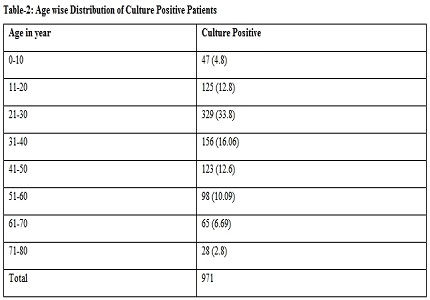Bacteriological profile and antibiogram of surgical site infection/ post-operative wound infection
Abstract
Background: Surgical site infections (SSI) constitute a major public health problem worldwide and are the second most frequently reported as Nosocomial infections. Surgical site infections are responsible for increasing the treatment cost, length of hospital stay and significant morbidity and mortality.
Objectives: Bacteriological profile and antibiogram of Surgical Site Infection /Post-operative wound infection and to find drug useful for empirical treatment.
Material and Methods: The retrospective study was conducted for a period of one year (January 2015 to Dec 2015) in the Department of Microbiology of BPSGMC Khanpur Kalan, Sonepat, Haryana.Samples were collected using sterile cotton swabs. 1687 patients clinically diagnosed of having SSIs were processed as per standard microbiological techniques. Antimicrobial susceptibility testing was done using modified Kirby-Bauer disc diffusion method.
Results: Among 1687 patients screened for SSIs, 971 (57.5%) were culture positive. Staphylococcus aureus (25.5%) was the commonest organism followed by Escherichia coli (23.5%), Citrobacter species (17.3%) and Pseudomonas aeruginosa (9.9%). Antimicrobial profile of gram positive isolates revealed maximum sensitivity to Linezolid and Vancomycin, whereas among gram negative isolates Imipenem, Gentamicin, Piperacillin-Tazobactam, and Amikacin were found to be most sensitive.
Conclusion: Staphylococcus aureus was the commonest pathogen isolated followed by E.coli (23.5%). Imipenem, Piperacillin/ Tazobactum, Gentamicin and Amikacin can be used as empirical treatment for gram negative bacilli and for gram positive organism Vancomycin and Linezolid can be used as empirical treatment in patients with Surgical Site Infection
Downloads
References
CDC/NHSN. Surveillance Definitions for Specific Types of Infections. 2016 April; 1-24.
Owings MF, Kozak LJ. Ambulatory and inpatient procedures in the United States, 1996. Vital Health Stat 13. 1998 Nov;(139):1-119.
Sabiston. Text book of surgery: The biological basis of modern surgical practice Beauchamp eversmattox surgical complications, (16th Ed) 199.
Dryden MS. Skin and soft tissue infection: microbiology and epidemiology. Int J Antimicrob Agents. 2009 Jul;34 Suppl 1:S2-7. doi: 10.1016/S0924-8579(09)70541-2.
Sohil Ahmed Khan, Padma G.M .Rao, Anand Rao, Gabriel Rodrigues. Survey and evaluation of antibiotic prophylaxis usage in surgery wards of tertiary level institution before and after the implementation of clinical guidelines. Indian Journal of Surgery 2006; vol.68 (3): 150- 156.
Burke JP. Infection control - a problem for patient safety. N Engl J Med. 2003 Feb 13;348(7):651-6.
Sasse A, Mertens R, and Sion JP, et al. Surgical prophylaxis in Belgian hospitals Estimate of costs and potential savings. J Antimicrobial Chemotherapy 1998;41: 267-272.
MacFaddin J. Biochemical Tests for Identification of Medical Bacteria. 3rd ed. Philadelphia: Lippincott Williams and Wilkins; 1976.
Forbes BA, Sahm DF, Weissfeld AS. Bailey and Scott’s Diagnostic Microbiology,10th ed, St. Louis,Misssouri, USA: Mosby Inc.; 1998.
Clinical and Laboratory Standard Institute. Performance Standards for Antimicrobial Susceptibility Testing.Vol. 1, No. 1, M2 A9. Pennsylvania, USA: Clinical and Laboratory Standard Institute; 2007.
Malik S, Gupta A, Singh PK, Agarwal J, Singh M. Antibiogram of aerobic bacterial isolates from post- operative wound infections at a tertiary care hospital in india. Journal of Infectious Diseases Antimicrobial Agents. 2011;28:45-51.
Lilani SP, Jangale N, Chowdhary A, Daver GB. Surgical site infection in clean and clean-contaminated cases. Indian J Med Microbiol. 2005 Oct;23(4):249-52.
Khan A K A, P V M, Rashed MR, Banu G. A Study on the Usage Pattern of Antimicrobial Agents for the Prevention of Surgical Site Infections (SSIs) in a Tertiary Care Teaching Hospital. J Clin Diagn Res. 2013 Apr;7(4):671-4. doi: https://dx.doi.org/10.7860%2FJCDR%2F2013%2F5323.2878. Epub 2013 Feb 27.
Chakarborty SP, Mahapatra SK, Bal M, Roy S. Isolation and identification of [14] vancomycin resistant Staphylococcus aureus from postoperative pus sample. Al Ameen J Med Sci. 2011; 4(2):152-68.
Vikrant Negi, Shekhar Pal, Deepak Juyal, Munesh Kumar Sharma, Neelam Sharma . Bacteriological Profile of Surgical Site Infections and Their Antibiogram: A Study From Resource Constrained Rural Setting of Uttarakhand State, India. Journal of Clinical and Diagnostic Research. 2015 Oct, Vol-9(10): DC17-DC20. DOI: https://doi.org/10.7860/JCDR/2015/15342.6698.
Pooja Singh.Gangania, Varsha A. Singh, Sunil Sekhar Ghimire. Bacterial Isolation and Their Antibiotic Susceptibility Pattern from Post-Operative Wound Infected Patients. Indian J Microbiol Res 2015;2(4):231-235. https://pdfs.semanticscholar.org/0075/a8fb0c589992e7a77892172b355788d039b9.pdf.
Mulu W., Kibru G., Beyene G., Damtie M. Postoperative nosocomial infections and antimicrobial resistance pattern of bacteria isolates among patients admitted at Felege Hiwot Referral Hospital, Bahirdar, Ethiopia. Ethiopian Journal of Health Sciences. 2012;22(1):7–18.
M. Saleem, T.V. Subha, R. Balamurugan, M. Kaviraj, R. Gopal. Bacterial Profile and Antimicrobial Susceptibility Pattern of Surgical Site Infections – A Retrospective Study. Indian Journal Of Applied October 2015,Research Volume: 5, Issue: 10, ,ISSN - 2249-555X.
Jyoti Sonawane, Narayan Kamath, Rita Swaminathan, Kaushal Dosani. Bacteriological profile of Surgical Site Infections and their Antibiograms in A Tertiary Care Hospital Navi Mumbai. Bombay Hospital Journal, 2010,Vol. 52, No. 3.
Prem Prakash Singh, Dr. Rehana Begum, Dr. Sudhir Singh, Mukesh Kumar Singh. Identification and Antibiogram of the Microorganisms Isolated from the Post operative Surgical Site Infections among the patients admitted in the hospital TMMC & RC, Moradabad. European journal of biomedical and pharmaceutical sciences 2015, volume 2, issue 4, 932-942.



 OAI - Open Archives Initiative
OAI - Open Archives Initiative


